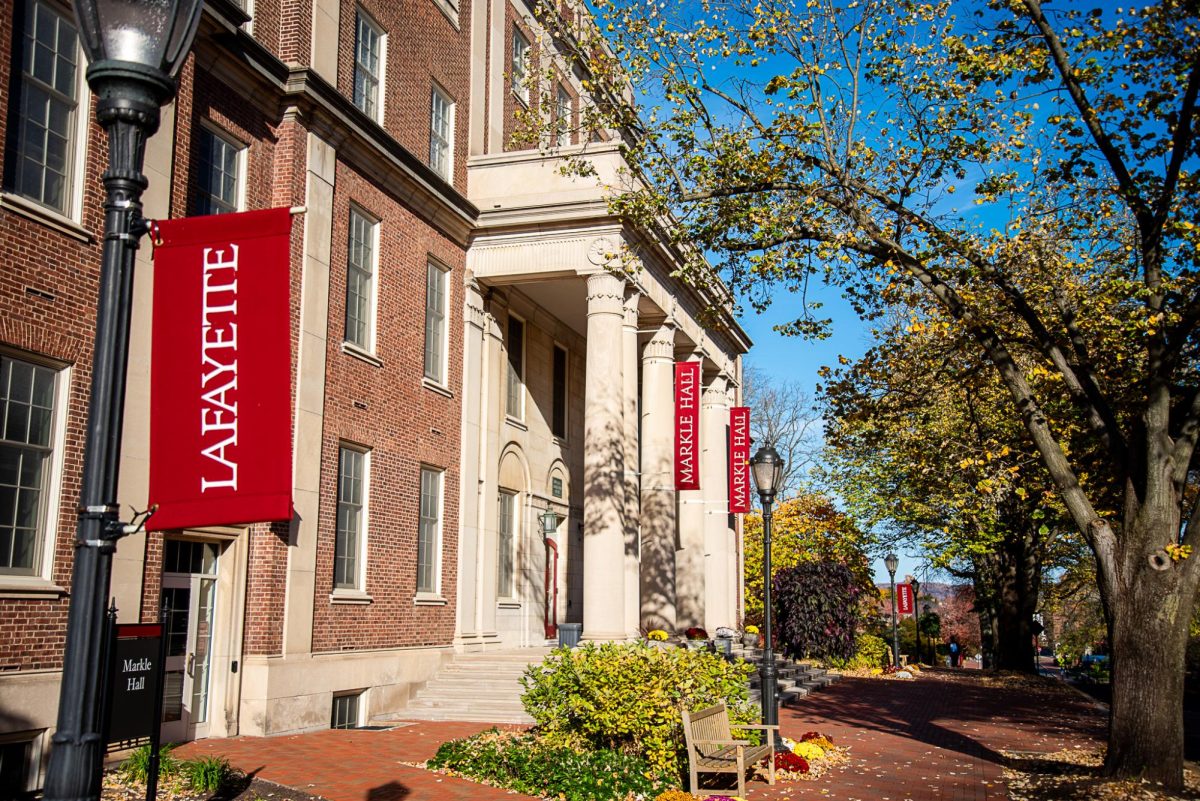The Lafayette College faculty passed the creation of a new ad hoc committee dedicated to gathering faculty perspectives on the college’s financial resources for academics in a 92-43 vote during its meeting on Oct. 22.
The motion, with 26 faculty signatories, proposed the creation of the Ad Hoc Faculty Committee on Financial Stewardship and Accountability. It cites many “deeply troubled” faculty members and “grave concerns” about financial communication from the college administration and the resourcing of the academic division, specifically, faculty compensation, as motivation to create the committee.
According to Clerk of the Faculty Joshua Smith, the creation of an ad hoc committee by the whole of the faculty is “rare” and last occurred in 2018.
The Lafayette obtained a copy of the motion and the written presentation that was given at the meeting.
The committee “will create a much-needed forum for the faculty––especially the untenured faculty––to voice their concerns about the resources the College has been allocating to the academic division,” wrote philosophy professor and motion signatory Alessandro Giovannelli in an email.
The motion highlights a lack of communication and inaction about compensation from the college budget planning committee, created in 2022 as “a campus-wide advisory committee that is a key participant in guiding the College’s budget development process,” according to its website.
“We did a poor job of that last year,” said James DeVault, an economics professor and member of the budget planning committee, about communication. “We’re committed to doing a better job.”
The motion claims that the budget planning committee has been “ineffective” in addressing concerns because of its “overwhelming workload.”
“The campus-wide committee is tied to other budgetary concerns than the academic division,” said Robert Blunt, a religious studies professor and signatory of the motion. “We wanted a committee that specifically addressed the concerns of the faculty regarding the academic division.”
DeVault emphasized that the budget planning committee must “balance the interests of all groups.”
Compensation is a “major issue” that the committee addresses, he said. However, compensation can only be determined after the decisions for the size of the incoming class and cost of attendance are made because they determine revenue, which then determines how much can be spent on compensation.
“You gotta have some sense of how big the pie is gonna be before you start cutting it up,” DeVault said.
“The College seeks to make Faculty compensation competitive with institutions of Lafayette’s size and quality, within the limitations of the budget,” states the faculty handbook.
In the 2011 Faculty Excellence Initiative, the college committed to maintaining faculty compensation at the median of a group of 25 “peer institutions.” According to Michael Nees, a psychology professor and presenter of the motion, the college has been well below this median in recent years, which he claimed has been impacting faculty retention and recruitment during the presentation.
Blunt cited Nees’ data presentation during a May faculty meeting that showed a disparity in rankings between faculty output of scholarly articles and compensation within their peer institution group as a main incentivizing concern for the creation of the ad hoc committee.
Nees declined to comment further, though he shared his data sets and methodology with The Lafayette. The Lafayette could not independently verify the data presented at either meeting.
The motion also lists six quotes from college President Nicole Hurd about committing to this goal during faculty meetings in the past three years and states that there has been no presentation of a plan to do so.
“The levels of raises have been above the national average – 4%, 5% and 3.5% over the last three years,” Hurd wrote in an email to The Lafayette about the college’s commitment to faculty compensation targets.
Hurd also noted that she announced earlier this month that she is appointing a task force on compensation “to provide advice on a longer term compensation philosophy and strategy.”
The ad hoc committee is not without opposition. Women, Gender and Sexuality Studies Professor Mary Armstrong, another signatory, described the meeting discussion as “robust.” Blunt said that “there were certainly contributions criticizing the motion,” but that these critiques were not incorporated into edits.
DeVault, for example, would have favored a college-wide compensation committee to address similar issues to ensure a balance between the interests of faculty and staff, something he said he shared at the meeting’s discussion.
“Faculty are paid considerably more than staff, and one of my concerns with this motion is that it might exacerbate that inequality between the two groups,” he said.
“I don’t want to give the impression that this is only about compensation,” Blunt said. “This is also about the general provisioning of the academic division as the most vital part of what our budgetary processes should be about, and some of us have concerns that it’s taken a back seat to other institutional priorities.”
Hurd also disagreed with several pieces of information presented in the motion.
For example, the characterization of Hurd’s “selective reporting” in the motion regarding transparency during recent faculty meetings is “an unfair interpretation of this information,” she wrote.
“I shared at the August 27 meeting the information we had,” Hurd wrote.
Armstrong, Blunt and Giovannelli all emphasized the collaborative nature of the creation of the committee and declined to comment on or did not respond about specifying the main authors of the motion.
The committee’s five members will ultimately determine how its actions are funded — the motion suggests crowdfunding — and methods of enacting its goals. As an ad hoc committee, it will be dissolved once its responsibilities are fulfilled at the end of the spring semester.
According to DeVault, also the acting chair of the faculty governance committee, the calls for the self-nomination of faculty members for the committee have already been released. Nominees will be required to collect five faculty endorsements and then will be evaluated by the governance committee.
“I really encourage folks to self-nominate,” he said. “This committee is only going to be as good as its membership.”
“I cannot emphasize enough the committee is about information,” Armstrong said. “Information is a good thing. It helps us have good discussions, and it helps us make the best decisions.”
Several signatories of the motion declined to comment. Several uninvolved faculty members declined to share their voting decisions, which are confidential. Provost Laura McGrane and Vice President for Finance and Administration Audra Kahr declined to comment, citing busy schedules.



























































































































